Room
for one more...
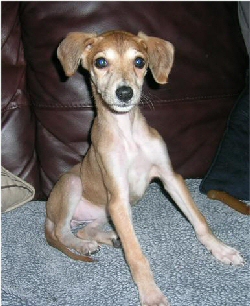 Agility
folk love their dogs - all of them from the weeny puppy to the ageing geriatric on pain
pills. Why so many dogs? Because they love their agility, too. If you want to keep
competing in agility, stay up-to-date with the latest training techniques and remain in touch
with all your like-minded friends, your pack
will most likely keep growing. Mary Ann
Nester has some suggestions for introducing a new puppy to your agility pack. Agility
folk love their dogs - all of them from the weeny puppy to the ageing geriatric on pain
pills. Why so many dogs? Because they love their agility, too. If you want to keep
competing in agility, stay up-to-date with the latest training techniques and remain in touch
with all your like-minded friends, your pack
will most likely keep growing. Mary Ann
Nester has some suggestions for introducing a new puppy to your agility pack.
Agility people are
special folk. How many people do you know that have three or more dogs, are content to be
always washing vets beds and are happy to spend most of their time standing in queues whatever
the weather?
You won't love the
old boys any less and your heart is big enough for a new baby. But it does present problems. It
may have been easy to get your hubby to agreed to another puppy but convincing your existing
pooches that more competition for your time and cuddles is a good thing may be harder. Unlike
your very first dog, your new pup won't be able to think all the cookies in life are his. He
will not only have to learn to bring your hubby his slippers, fetch the kids toys and do
agility for you but he will have to make a study of all your canine pack's idiosyncrasies. To
fit in, he's got a lot to do to belong and earn his t-shirt..
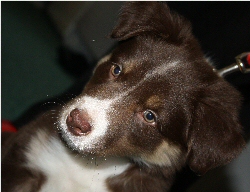 Be
Prepared Be
Prepared
So do as much as you can to get ready in
advance. Find a space for your puppy pen. Make sure it is somewhere easily accessible but not
in the way. Buy in puppy food. Make an appointment at your vet for a health check. If you are
anything like me, you'll want to start with a new bowl, collar and lead and toys rather than
recycling old ones. More importantly, prep your pack for your puppy's arrival.
-
Play time:
If your dogs are used to picking up and putting down toys as and when they feel like it,
it's time for a new routine. Bones, chews and tennis balls can all inflammatory objects if
just left lying around, especially when there is a wee puppy pottering about. Get your dogs
use to a limited playtime when balls and bones come out of the box and then go back in an
hours or so later.
-
Obedience:
It is a good idea to review your basic sit, down, come and stays with your adult dogs. I know
they can do all this stuff, but a youngster in the house is a dreadful distraction. You don't
want them to think, 'Great! We can do what we want while she struggles to get a lead on
Junior'.
-
Havens of
Tranquillity: And like your pup, your adult dogs should all have somewhere they can
retire to when they can't stand any more baby talk. This may well be their cages or beds. A
room upstairs is great as the little guy will take a while to learn steps!
 Introductions Introductions
Time to make the introductions. Don't
assume that because they are all dogs that they will automatically like each other. Choose
somewhere neutral with you acting as referee. A friend's back garden or a quiet corner of the
park if your pup is already vaccinated. Otherwise, your own back garden will have to do.
Start with a single
dog. When they are bored of sniffing each other, put your adult away and bring out the next one
until everyone has had a chance to inspect each other. If the meeting and greeting gets too
boisterous, walk away. Odds are that your older dog will follow you, so attach his lead and
take him back into the house. When everyone has had the opportunity to shake paws, give
your pup a quick rest and start the whole rigmarole over again in the house.
Me or the Pack?
our pup needs to feel safe and secure to
develop into an individual and well balanced dog. He belongs to you, but he also belongs to the
rest of your household - human and canine. The interplay is important for his general
well-being and inner self. A dog that is obsessed with Mummy may not have the canine social
skills to cope with your pack when he's left in your caravan garden or let loose on the
exercise field. And a dog that prefers canine company, will probably leave the ring to party
with his four legged chums. Can your pup form a bond with both - you and your pack?
The Boss
I think so. Be the Boss. It is your job to
manage feeding time, play time, free time, pack time ... in fact, every one of your pup's
waking minutes. Get the balance right and your pup will grown into a well adjusted individual
that can hold his own in your home. Be especially vigilant when he is young, impressionable and
squashy. Watch and listen so you can spot if your baby is pooped, alert, hungry or belligerent
and intervene or ignore as you thinking necessary. No one said this would be easy!
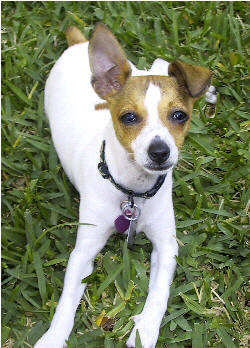 The
Pack The
Pack
Let's leave significant others and children out of the equation for now - I've too much
experience of one and none of the other - and concentrate on the dogs. Make your pack feel
valued and let them do their jobs, including teaching the little upstart that he needs to watch
where he is going and mustn't shove past them.
Keep to the same
routines. Dogs love the status quo. If Turbo has always had dinner from a bowl by the stove,
don't move it somewhere else especially as he's getting a bit senile. If you have always gone
training on a Tuesday, don't stop. If you regularly walk everyone in the morning, keep to the
same plan. Don't change things unless you have a very good reason to do so. Your pack has a
role in your pup's up bringing. Are you going to demonstrate how to sniff anal glands? I
really hope not.
The Pup – Pack Candidate:
Slot him into your life as discretely as possible. He will make enough noise to get
himself noticed without you adding to the hullabaloo. There is space and time for him. It is
just a question of finding it.
Don't minus time
from your older dogs to spend it with Junior. Give up an hour of television, eat your dinner
faster or get out of bed at six instead of seven. We all have to make sacrifices. Try and
remember that it won't always be like this, but the extra effort you make now bonding with your
new puppy will pay dividends later. And remember.
Quality time alone
with you is not you cleaning out the van while your pup plays solitaire. You need to interact
with the little blighter. Most pups would love to be involved in unearthing treasure from deep
within your van. Include him and make it a game. 'Wow! I found an old tennis ball – go get it!'
or 'Fantastic! A biscuit that fell out of the pack – can you sit?'
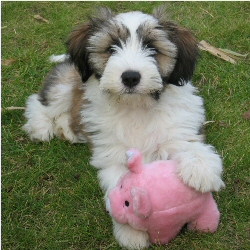 Time
Together Time
Together
It is important that you and your pup spend
quality time together. And with your pack. Give your puppy the chance to integrate with his own
kind but supervise him. He won't have the presence or strength of an adult dog so watch him
carefully.
Pack time can be
going on a walk together, a game of chase in the garden, or everyone having a snooze while you
watch television. By controlling pack time you will be reinforcing your role as the Boss! It
can be a very passive role that delegates authority and allows Butch to tell Junior off for
stepping on his tail. Or it can be a very active one; for example if you think things are
getting out of hand, pick up all the toys and send everyone to their beds or kennels.
Be confident in your
managerial skills. Agility folk are in charge of more dogs than the average household at home,
at training or on holiday and it needn't be a nightmare. But it is important that you get
things right from the start, especially if the goal is a dog that wants to please you as well
as fit in with your pack. With a little forward thinking and time management, it is possible.
Good luck and
please, please, please let me cuddle your puppy!
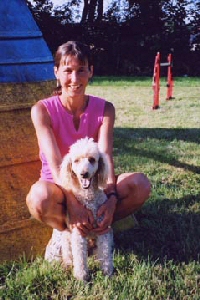 About
the author... About
the author...
Mary Ann Nester was born in the USA and came to
Britain in 1972 as a student. In 1997 she set up Aslan Dog Training Club, named after her
Lurcher and first agility dog.
Mary Ann's most successful agility dogs
have been miniature poodles. Both Brillo Pad and Daz have both been finalists at Olympia and
Crufts and have competed at international level. Brillo represented Great Britain at the World
Agility Championships in Portugal 2001 and Daz in Germany 2002 and France 2003.
When not training other people's dogs
or chasing her own, Mary Ann splits her time between being the Clinic Administrator for Vets
Now Out of Hours Emergency Service and writing. She is the author of
Agility Dog Training,
published by Interpet in 2007 (Agility Warehouse) and looks forward to seeing Dancing With
Dogs: The Complete How to and Troubleshooting Guide to Canine Freestyle and Six Smart
Tricks for Dogs in the book shops later this year.
|